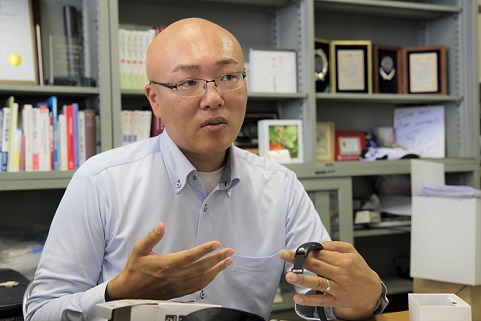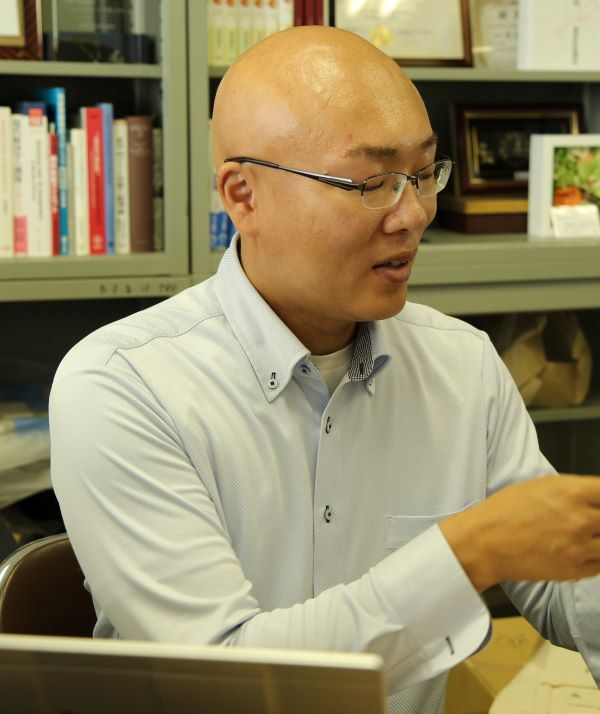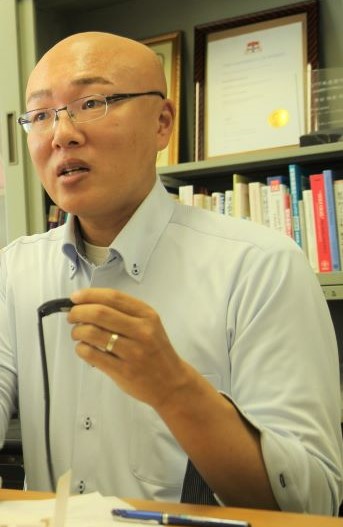On February 1, 2013, Hiroshima University established two new programs: the “Distinguished Professors” (DP) program and the “Distinguished Researchers” (DR) program. Individuals who are part of these programs are recognized as senior and junior faculty members respectively, who are engaged in extraordinarily distinguished research activities.
A Conversation with Distinguished Researcher Yoshihiko Kadoya

Tell us about what you do and your specialist field.
I am a Health Economist at the Department of Economics. We deal with health as a good. Basically, we investigate how we can distribute limited healthcare services to people effectively and efficiently.
You work for HiHER now, what do they do?
Hiroshima Institute of Health Economics Research (HiHER) is a multidisciplinary institute that aims to be a world-class health economics research institution, merging social sciences (such as economics) with medical research, including radiation, psychiatry, and social medicine.
The institute tries to solve the issues faced by an aging society. The challenges to the fair and efficient distribution of necessary medical and long-term care services in Japan, the front-runner of demographic aging, have attracted much attention globally. this problem is shared with other developed and also developing nations, especially in Asia.
How did you get into this field of work?
I knew that Japan would face difficult challenges to the fair and efficient distribution of necessary medical and long-term care services to its aging society. So, I wanted to do something about it using the skills of economic analysis. I wanted to apply economic methods to the real world!
What are you working on now?
I usually run about 30 projects at time. These include household finance, health-conscious work strategies and tactile marketing.
Among them, our health-conscious work strategies deal with the relationship between workers '(mental) health and their productivity. We utilize a biometric device that captures the emotion of the subjects using their users' heartbeat rhythm. We separate emotional status into 4: happy, sad, angry and relaxed. We try to identify the tasks that stress the user and offer suggestions based on our analysis. We, for example, found that the happier you are the more productive you become based on our experiment with the labors assigned with a very simple task.
Also, we have another business project that significantly on tactile marketing (or tactile impression). This is people's willingness-to-pay for the impression people have when they touch something. We have 5 senses but there is too much focus on the visual information, like when you shop online. Actually, tactile impression is very important.
We did an experiment using smartphones as people use these for many hours in a day. We prepared 5 simple smartphone covers from a 100-yen shop, kept one as a default and put some tactile material on the others. People were asked to rate how much they are willing to pay based on what they felt. We found some interesting results and plan to publish them in very near future.

You mentioned one of your projects is about household finance. Is being financially literate an important part of your work?
As Japan knows life expectancy has improved while the retirement age has still similar over the last several decades. In Japan, retirement age is 60-65 years old but life expectancy is much higher. Nowadays if you retire at the age 60, if you are a Japanese woman you can live about 27 years after retirement without stable income. So, we have to be wise about our investments. If you keep your money in cash the value diminishes because of inflation. If you purchase stock that value of the investment may go up. If you don't have financial knowledge you tend to keep money as cash and lost the value in the long run.
How can we implement your research in our daily lives?
Most of our recommendations are helpful for the government policy. We write policy reports and send them to policymakers.
On the smaller scale, if you are educated financially you can plan better, and you will be less likely to worry about the future. That is something you can take home.
Have you any thoughts about the consequences of your work on ageing populations in countries like Japan and Germany?
The elderly could live and work longer than before. If people use health-conscious working strategies, they can work longer. Nursing homes can also use it to monitor the health of patients easier.
The market is not mature yet, but we could also make better products for the elderly with tactile impression analysis such as walking canes.
What is the best thing about working at Hiroshima University?
I like HU because the non-academic staff are very helpful. The Science Communication Fellow and PR Group help promote my research a lot. The Research Support is quite unique here.
Also, HU is a comprehensive university so you can meet specialists in other fields. Today’s social problems are quite complex so you can’t solve everything with one type of knowledge.
Also, it is a nice area. It is quiet and peaceful!

You studied in Sydney. What was that like compared to Japan?
Research-wise in Western countries research has a more business management orientation. For example, “the aging issue is the current trend so why don't we hire more people from that field”, cutting funding from other fields. Here it is more relaxed. Even if a field has attracted lots of attention from the public the change is quite limited. Less profitable fields still remain a part of the research community.
Innovation always comes from unexpected fields.You never know where the next innovation comes from!
What advice do you have for today's students?
Travel a lot! I was surprised to see that the ratio of youngsters that who hold a passport is among the lowest of developed countries.
When not in the office how do you spend your time?
I play with my daughter in the park. There is plenty of nature around here.

 Home
Home